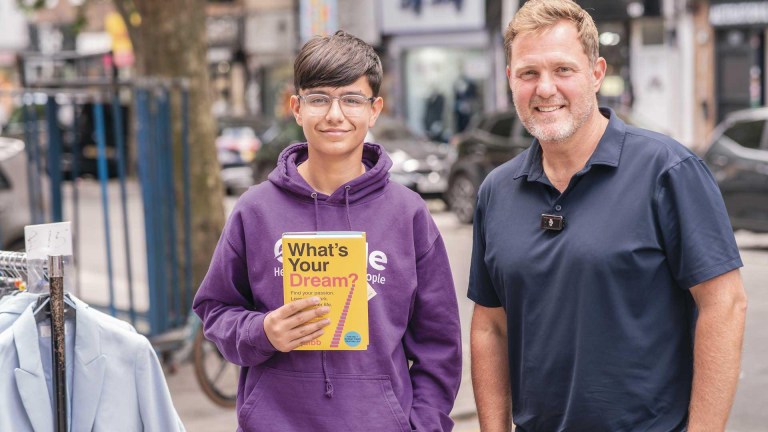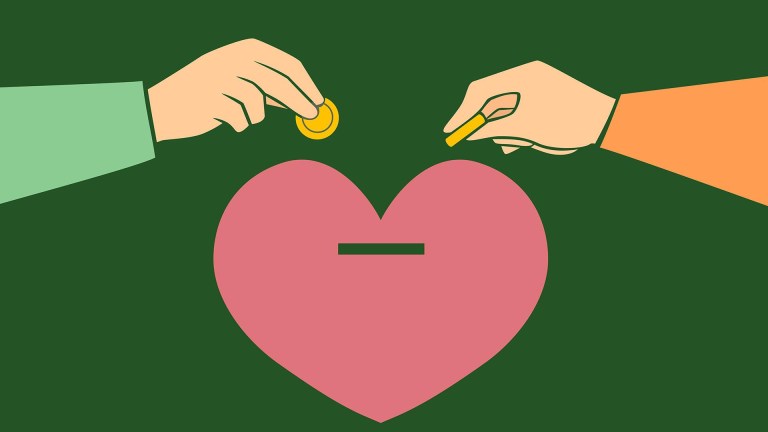“We need a fairer post-Covid-19 settlement, one that invests in young people so that they are better protected from the danger of long-term economic scarring. That may mean dampening down rather than overheating the housing market, basing taxation on wealth rather than income, and reducing the burden of student debt repayment.”
While these policies would likely be very popular with young people, they are unlikely to
So, for now, a basic knowledge of personal finance – how to budget, save, claim the benefits to which you are entitled, and avoid the growing threats of high-cost debt, coupled with an epidemic of scammers preying on economic insecurity – is becoming increasingly vital.
Andy Haldane, chief economist at the Bank of England, says more needs to be done to prioritise financial education.
“This need has only been exacerbated by the events of the last year, which have further increased young people’s anxieties about money,” he said.
The London Institute of Banking & Finance, in its 2021 Young Persons’ Money Index, found 82 per cent of 17 and 18-year-olds regularly worry about their personal finances, and nearly half didn’t understand how student loans work. Here’s our vital guide to how millennials and Gen Z can get a handle on their Covid-battered finances.
Advertising helps fund Big Issue’s mission to end poverty
What practical steps can young people take in the meantime? Over the coming months The Big Issue’s Ride Out Recession Alliance (RORA) will be providing advice, flagging job opportunities, apprenticeships and training courses, as well as asking experts for their money help and tips to support those struggling with the economic consequences of the coronavirus pandemic, including our younger generations.
Start an emergency fund
Debt charities say that the most common reason people end up borrowing money, and getting trapped in paralysing debt, is an unexpected expense or sudden drop in income. Almost 6.6 million adults have nothing set aside for this scenario, according to new research from the money app Yolt, but financial shocks in the last year, such as pay decreases, saw people lose an average of £6,000 off their annual household income. Ask any financial adviser and they will insist on the importance of having an emergency fund, a sum of money that you can get your hands on if something unexpected happens.
Yolt reckons £12,500 is the ideal amount to aim for – a daunting sum for most young people. Debt charities suggest £1,000 as a minimum. Start backwards, how much can you afford to put aside each week or month? Pay that to a separate account.
Bola Sol, the millennial author of How to Save it: Fix Your Finances, suggests three to six months of essential bills. “If 2020 has taught us anything, it’s that we all need to pay attention to our finances and have a viable financial back-up plan. With things like furlough, unexpected redundancies and Universal Credit hovering in the wings, we cannot and should not be attempting to survive purely on what our monthly income happens to be.
“What constitutes enough savings can only be determined by you. For some people it may be 12 months of their salary. You choose what you’re comfortable with.”
The best budgeting apps
There are lots of handy apps that make it easier to look at where you could cut back on spending and help you build an emergency fund automatically.
Advertising helps fund Big Issue’s mission to end poverty
Money Dashboard lets you view all your accounts in one place, giving a holistic view of your finances and where you might be going wrong. Emma does similar, helping you identify those recurring subscriptions that you forgot about, and warning you of bills and direct debits due.
Yolt offers a prepaid contactless debit card, to encourage you not to go overdrawn, as well as save without noticing
by rounding up your spending and moving it automatically into its Money Jar. Moneybox will also round up your spending, allowing you to save in an ISA or invest in the stock market.
Chip, Plum and Cleo all offer automatic savings functions, using AI to analyse your account and move money away from temptation into a savings or investment fund.
Claim benefits and tax reliefs, and top up a lifetime ISA before April 6
Make sure that you understand and apply for all the benefits or tax breaks you’re entitled to. There is over £15bn of money being unclaimed, including by young people, believes the charity EntitledTo, such as child benefit, tax breaks on childcare for parents who work (worth up to £2,000 a year) and Covid-specific help such as the self-employed income support scheme. Its website and turn2us.org have free benefit calculators showing you exactly what you may receive.
The end of the tax year on April 5 is a deadline to claim anything you might have been entitled to over the past 12 months, including money towards equipment for working from home, marriage tax allowance and tax breaks on savings in an ISA.
This includes a lifetime ISA (LISA) for young people saving for their first home. If you’re aged between 18 and 39 you can put up to £4,000 per tax year away, and receive a 25 per cent bonus, up to £1,000 a year, from the government, if you use the savings to buy your first home.
Advertising helps fund Big Issue’s mission to end poverty
April is also the deadline to withdraw any money from your LISA penalty free. Usually you have to forfeit some of your savings if you don’t use the cash for a property – this was waived during the pandemic, but as of April 6 the penalty comes back in.
Free online money help
There is an increasing amount of brilliant, free online personal finance information, courses and communities to tap into for those who can’t afford or don’t have enough savings to make it worth shelling out for financial advice.
Be wary of the fraudsters or grifters, however. Social media is rife with unqualified influencers offering paid-for training courses in risky investing or cryptocurrency, which should be avoided.
Search, instead, for debtstagrammers, with hashtags like #debtfreecommunity and #debtfreejourney for people sharing their own money stresses and how they manage them.
Networks such as The Financial Wellbeing Forum by Clare Seal and vestpod.com, run by Emilie Bellet, are communities of millennial and Gen Z women offering free money guidance on everything from how to budget to getting started in investing, in the form of newsletters, workshops and podcast The Wallet.
The charity MyBnk has a new YP Zone aimed at 16 to 25-year-olds during the pandemic, with free digital money tools, videos, chatbots and e-learning courses and guides. Developed with The Mix and Money and Pensions Service, it has also introduced a new saving text message service and a special course on becoming financially independent at university, covering banking, borrowing, budgeting and spending.
Advertising helps fund Big Issue’s mission to end poverty
If you are a young person on a pathway to housing you can refer yourself to The Money House, which has gone virtual this year. It’s a free live Zoom course run by an expert dedicated to helping you live independently and keep your home. They work with councils and are supported by the Berkeley and JP Morgan Chase Foundations, Pimco and L&Q.
Laura Whateley is The Big Issue’s RORA correspondent
Contact her with questions, concerns and ideas about jobs and money at laura.whateley@bigissue.com










